Updates on MA RRP Rule From The MA Department of Labor Standards
 As EPA amends the RRP rule, renovators working in states that have taken over the rule from EPA need to know if and how these states incorporate the changes into their own rule. Yesterday I inquired with the State of Massachusetts to find out about a few recent amendments and changes.
As EPA amends the RRP rule, renovators working in states that have taken over the rule from EPA need to know if and how these states incorporate the changes into their own rule. Yesterday I inquired with the State of Massachusetts to find out about a few recent amendments and changes.
One of the good things about the state of Massachusetts taking over the RRP rule is that communications with the Department of Labor Standards (DLS) is much easier and much quicker than trying to get answers from EPA. I also find their staff is much more informed and always helpful. The Q&A below was conducted completely via email (I sent the questions out of the blue) and I got a complete and what I would call an intuitive response in less than 4 hours! Credit to the DLS!
Here is the Q&A
 Question: Can you tell me if MA allows the lead safe renovation supervisor to take paint chip samples same as EPA does?
Question: Can you tell me if MA allows the lead safe renovation supervisor to take paint chip samples same as EPA does?
DLS Answer: Massachusetts incorporates the federal protocol by reference in our regulation. LSR Supervisors are authorized to sample painted surfaces in accordance with their training. Of course, they must do adequate sampling for different painting histories of surfaces, document their findings, maintain records of testing and provide documentation to the property owner as required.
Question: Does MA require that the firm provide the renovation checklist to owners and tenants within 30 days of completion of final billing, whichever comes first (just like EPA)?
DLS Answer: Yes. DLS has the same documentation requirements as the federal rule.
Question: EPA requires towns and municipalities to become certified firms and have Certified Renovators before doing their own RRP work on town properties that are target housing and or Child Occupied Facilities. They can however hire out the work to a Certified Firm and therefore would not need to be a Certified Firm if the work is hired out to one. Does the Massachusetts law follow the same requirements?
DLS Answer: Yes. Massachusetts mirrors the requirement but offers the opportunity for the fee to be waived for property owners with trained employees working on their own properties.
You can find them listed on our LSRC list published on the DLS web pages.
 Question: Also, does MA now recognize LeadCheck for Drywall and Plaster?
Question: Also, does MA now recognize LeadCheck for Drywall and Plaster?
DLS Answer: Yes. But as usual, there is a caveat which is also applicable at the federal level. When the trained individual takes a sample – s/he must follow the prescribed protocols. In order to take advantage of the new approval; they must follow the new testing methods and adequately test surfaces. In some cases, many samples must be taken in order to effectively disclude the work under the rule.
Training Providers will likely being teaching the new methods, however, those who were previously trained will need to justify that they know how to sample in order to validate their findings. Of course, the safest path is to presume the presence of lead.
Question: Any other updates or clarifications I should know about?
DLS Answer: I know you are aware that DLS has been doing enforcement and civil penalties. We are still interested to have the regulated community provide us feedback to provide better regulations. I don’t have a specific date but we will certainly let you know when we are going back to public hearings to update our regulation.
Its spring and we are in the field doing compliance checks.

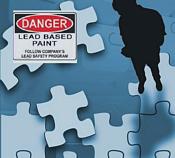 Looking for accurate information about the EPA RRP rule?
Looking for accurate information about the EPA RRP rule?  There has been a lot of confusion regarding the details of the EPA RRP rule. One that seems to pop up over and over is certification requirements for sub contractors. There are two different certification considerations regarding sub contractors; firm certification and worker certification. Let’s take a look at each separately.
There has been a lot of confusion regarding the details of the EPA RRP rule. One that seems to pop up over and over is certification requirements for sub contractors. There are two different certification considerations regarding sub contractors; firm certification and worker certification. Let’s take a look at each separately. Whether working for the general contractor as a trade partner or a 1099 sales person (offers the work), sub contractors must become certified firms by apply for certification through the EPA. Ensuring that the subs they use are certified firms is particularly important for general contractors, because as part of the required documentation under the rule, the renovation checklist must include the names of all workers who participated in RRP activities on the job. If a sub contractor and his workers do work on the job and the sub’s firm is not certified, the EPA will easily be able to find both the general contractor and the sub in violation of the rule. If a general contractor knows that subs must be certified firms, hiring a non-certified firm to work on a job becomes a knowing and willful violation of the rule, which brings with it serious penalties. It’s also one easy way for a customer’s lawyer to suggest the contractor is/was negligent.
Whether working for the general contractor as a trade partner or a 1099 sales person (offers the work), sub contractors must become certified firms by apply for certification through the EPA. Ensuring that the subs they use are certified firms is particularly important for general contractors, because as part of the required documentation under the rule, the renovation checklist must include the names of all workers who participated in RRP activities on the job. If a sub contractor and his workers do work on the job and the sub’s firm is not certified, the EPA will easily be able to find both the general contractor and the sub in violation of the rule. If a general contractor knows that subs must be certified firms, hiring a non-certified firm to work on a job becomes a knowing and willful violation of the rule, which brings with it serious penalties. It’s also one easy way for a customer’s lawyer to suggest the contractor is/was negligent. On the other hand, since taking over the RRP Rule in MA, working with MA state officials has been much more productive. The Massachusetts Department of Labor Standards (DLS), formally called the Massachusetts Division of Occupational Safety, under the leadership of the department's Director Heather Rowe, has been very receptive to meeting with concerned stakeholders, hearing and recognizing stakeholder's concerns, and working with stakeholders to address their concerns. Currently, in addition to working on amendments to the RRP regulations in MA to address concerns, the DLS is also finalizing their plans to step up enforcement and compliance actions this spring as the home improvement season begins. Is it happening as fast as we all might like, no. However, based on budget and resource realities, I think DLS is doing a good job listening and prioritizing their efforts.
On the other hand, since taking over the RRP Rule in MA, working with MA state officials has been much more productive. The Massachusetts Department of Labor Standards (DLS), formally called the Massachusetts Division of Occupational Safety, under the leadership of the department's Director Heather Rowe, has been very receptive to meeting with concerned stakeholders, hearing and recognizing stakeholder's concerns, and working with stakeholders to address their concerns. Currently, in addition to working on amendments to the RRP regulations in MA to address concerns, the DLS is also finalizing their plans to step up enforcement and compliance actions this spring as the home improvement season begins. Is it happening as fast as we all might like, no. However, based on budget and resource realities, I think DLS is doing a good job listening and prioritizing their efforts. As one way to continue their efforts and interact with stakeholders, the Massachusetts Department of Labor Standards is looking for additional input from contractors and lead industry practitioners in anticipation of making amendments to the MA RRP regulations. An official from this agency will be participating in a May 18 workshop on the RRP Rule being held in Marlborough, MA sponsored by the Lead and Environmental Hazards Association (LEHA) and will be discussing the Department’s plans for revising the RRP regulations as well as the Department's enforcement efforts.
As one way to continue their efforts and interact with stakeholders, the Massachusetts Department of Labor Standards is looking for additional input from contractors and lead industry practitioners in anticipation of making amendments to the MA RRP regulations. An official from this agency will be participating in a May 18 workshop on the RRP Rule being held in Marlborough, MA sponsored by the Lead and Environmental Hazards Association (LEHA) and will be discussing the Department’s plans for revising the RRP regulations as well as the Department's enforcement efforts. While deleading activities conducted in residences and child-occupied facilities often involve work methods similar to those typically used in renovation, repair or painting (RRP) activities, such as replacing windows, painting and installing vinyl siding, the two types of activities are distinct from each other in terms of purpose and effect.
While deleading activities conducted in residences and child-occupied facilities often involve work methods similar to those typically used in renovation, repair or painting (RRP) activities, such as replacing windows, painting and installing vinyl siding, the two types of activities are distinct from each other in terms of purpose and effect.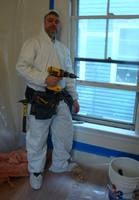 Once you have made the initial determination regarding whether your project is a renovation project or a deleading project, the next question is how to choose a contractor who is licensed and qualified to perform the work. Click on the following link to view a helpful guide on choosing a deleading contractor, “
Once you have made the initial determination regarding whether your project is a renovation project or a deleading project, the next question is how to choose a contractor who is licensed and qualified to perform the work. Click on the following link to view a helpful guide on choosing a deleading contractor, “ Yesterday
Yesterday  In my opinion, the ability to work with and interact with the same people who not only enforce the rule in MA, but also have the ability to help shape the MA RRP rule, has been a major plus for those Massachusetts contractors affected by the rule. At the budget hearing I shared this opinion and stressed that I hoped DOS would get adequate budgeting to keep such communication opportunities available in the future. Here are a few of the items I suggested at the hearing:
In my opinion, the ability to work with and interact with the same people who not only enforce the rule in MA, but also have the ability to help shape the MA RRP rule, has been a major plus for those Massachusetts contractors affected by the rule. At the budget hearing I shared this opinion and stressed that I hoped DOS would get adequate budgeting to keep such communication opportunities available in the future. Here are a few of the items I suggested at the hearing: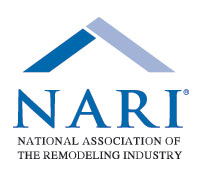
 The Commonwealth of MA Executive Office of Labor and Workforce Development will be holding public hearings where interested parties can attend to provide suggestions to Joanne F. Goldstein, the Secretary of Labor and Workforce Development, regarding how the money appropriated to the Department of Labor (DOL) and the Division of Occupational Safety (DOS) should be spent in Fiscal Year 2012.
The Commonwealth of MA Executive Office of Labor and Workforce Development will be holding public hearings where interested parties can attend to provide suggestions to Joanne F. Goldstein, the Secretary of Labor and Workforce Development, regarding how the money appropriated to the Department of Labor (DOL) and the Division of Occupational Safety (DOS) should be spent in Fiscal Year 2012. Proper and effective administration and enforcement of the RRP rule will take money. Because the amount of money the DOS and DOL will get in 2012 is already decided, contractors must voice their opinion as to how they think the money should be spent. It is my opinion that the money could actually be invested in the health and safety of Massachusetts citizens to protect them from the dangers associated with contractors who ignore lead-safe work practices. And, if properly and adequately enforced, the RRP rule would not only help to eliminate the underground construction economy here in Massachusetts, it would also help bring in additional revenue for the state in fees to those who get licensed to do the work, in fines to those who operate illegally and in taxes collected if all construction businesses doing RRP work have to pay their equal share of payroll and income taxes.
Proper and effective administration and enforcement of the RRP rule will take money. Because the amount of money the DOS and DOL will get in 2012 is already decided, contractors must voice their opinion as to how they think the money should be spent. It is my opinion that the money could actually be invested in the health and safety of Massachusetts citizens to protect them from the dangers associated with contractors who ignore lead-safe work practices. And, if properly and adequately enforced, the RRP rule would not only help to eliminate the underground construction economy here in Massachusetts, it would also help bring in additional revenue for the state in fees to those who get licensed to do the work, in fines to those who operate illegally and in taxes collected if all construction businesses doing RRP work have to pay their equal share of payroll and income taxes.  One of the differences between the EPA RRP Rule and the Massachusetts RRP Rule is that Massachusetts requires the Licensed Lead-Safe Renovation Contractor (firm) to maintain a sign in/out log, just like the one required for deleading contractors, for workers who enter and exit the contained work area during RRP renovations.
One of the differences between the EPA RRP Rule and the Massachusetts RRP Rule is that Massachusetts requires the Licensed Lead-Safe Renovation Contractor (firm) to maintain a sign in/out log, just like the one required for deleading contractors, for workers who enter and exit the contained work area during RRP renovations. 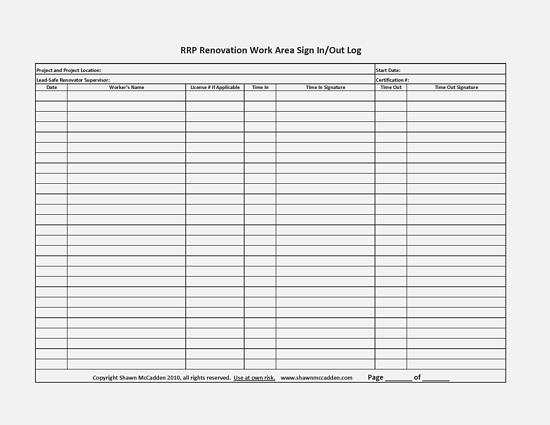
 Deleading under the MA Lead Law requires the removal or covering of
Deleading under the MA Lead Law requires the removal or covering of  At a recent
At a recent 
 Many contractors seeking to comply with the new EPA RRP rule are reporting concerns and challenges about finding trade partners who are willing to operate in compliance. Many renovators have told me that their trade partners have flat out refused to get their businesses and workers certified. Others have said their trade partners have committed to do so but have been slow to get it done due to the related costs. This has become quite an opportunity for some trade partners who have become certified and are marketing their certifications and services to general contractors. Several are actually offering to sub-contract the set-up, containment, demo, clean-up, cleaning verification and all related and required documentation for general contractors.
Many contractors seeking to comply with the new EPA RRP rule are reporting concerns and challenges about finding trade partners who are willing to operate in compliance. Many renovators have told me that their trade partners have flat out refused to get their businesses and workers certified. Others have said their trade partners have committed to do so but have been slow to get it done due to the related costs. This has become quite an opportunity for some trade partners who have become certified and are marketing their certifications and services to general contractors. Several are actually offering to sub-contract the set-up, containment, demo, clean-up, cleaning verification and all related and required documentation for general contractors. Who will take care of the notification requirements and documentation of same before the job begins? Under the rule, either can do so, but the business under contract with the property owner must maintain the required documentation.
Who will take care of the notification requirements and documentation of same before the job begins? Under the rule, either can do so, but the business under contract with the property owner must maintain the required documentation. The first time a RRP fine is accessed for a violation the finger pointing will start, causing one or both businesses to get serious about certification and compliance. The first time a renovator is sued by a client or neighbor as a result of the actions of a trade partner, the tactics used by the lawyers will cause both businesses to have a new and different outlook on RRP compliance, insurance coverage amounts and indemnification clauses.
The first time a RRP fine is accessed for a violation the finger pointing will start, causing one or both businesses to get serious about certification and compliance. The first time a renovator is sued by a client or neighbor as a result of the actions of a trade partner, the tactics used by the lawyers will cause both businesses to have a new and different outlook on RRP compliance, insurance coverage amounts and indemnification clauses.  To confuse matters even further, under their definition of the difference between an employee and an independent contractor, the IRS says that a contractor cannot supervise the work or workers of a sub contractor. Doing so might result in the IRS labeling the sub contractor as an employee. If this were to happen it could trigger addition payroll taxes and workers compensation costs for the general contractor.
To confuse matters even further, under their definition of the difference between an employee and an independent contractor, the IRS says that a contractor cannot supervise the work or workers of a sub contractor. Doing so might result in the IRS labeling the sub contractor as an employee. If this were to happen it could trigger addition payroll taxes and workers compensation costs for the general contractor.
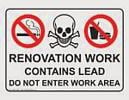 Second, the warning signs and barriers required to be put in place around exterior and common area containment areas will have a similar effect of raising concern. Unless properly educated about their options and about lead-safe work practices, neighbors and the parents of children attending child occupied facilities will again suffer from ignorance about lead. Many will likely react out of fear. This fear may potentially result in reporting a renovator and causing an inspection, even if the renovation work is being done within compliance.
Second, the warning signs and barriers required to be put in place around exterior and common area containment areas will have a similar effect of raising concern. Unless properly educated about their options and about lead-safe work practices, neighbors and the parents of children attending child occupied facilities will again suffer from ignorance about lead. Many will likely react out of fear. This fear may potentially result in reporting a renovator and causing an inspection, even if the renovation work is being done within compliance.  Remember, as a business you are guilty until you prove yourself innocent at your own expense. An OSHA and or RRP inspector will likely be able to find at least one violation of some rule if they show up at one of your jobsites. Some inspectors may even feel it is their obligation to find a violation. The cost to defend yourself might be as high as the cost of any fines, so even if you win you lose. In Massachusetts, the Department of Occupational Safety (DOS) is already collaborating with OSHA regarding what to do if either finds a violation that should be referred to the other. Oh, and don’t forget those neighbors who have a bone to pick with your customer, have nothing else to do all day, and or are just plain paranoid.
Remember, as a business you are guilty until you prove yourself innocent at your own expense. An OSHA and or RRP inspector will likely be able to find at least one violation of some rule if they show up at one of your jobsites. Some inspectors may even feel it is their obligation to find a violation. The cost to defend yourself might be as high as the cost of any fines, so even if you win you lose. In Massachusetts, the Department of Occupational Safety (DOS) is already collaborating with OSHA regarding what to do if either finds a violation that should be referred to the other. Oh, and don’t forget those neighbors who have a bone to pick with your customer, have nothing else to do all day, and or are just plain paranoid.


